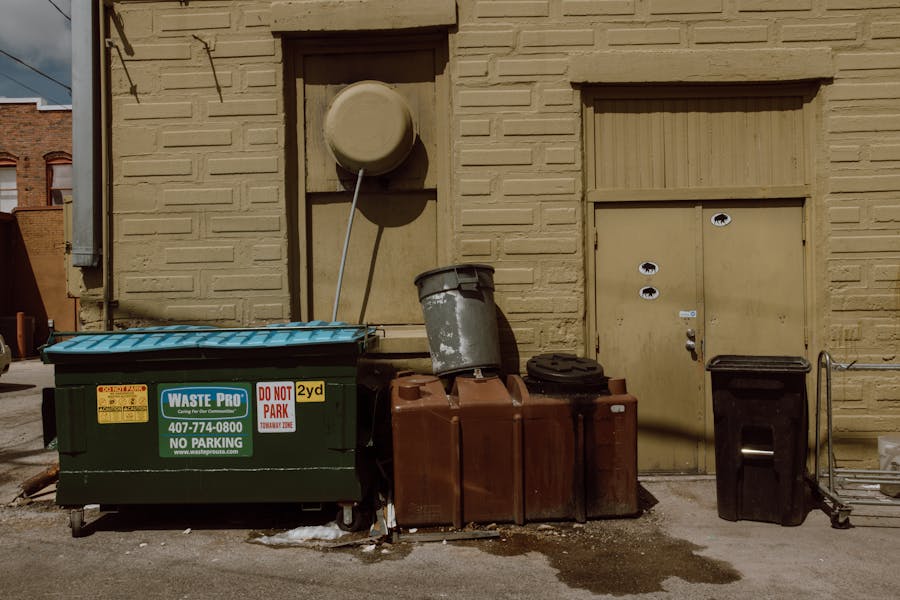Dumpster diving has grown in popularity as people seek alternative ways to reduce waste, save money, or even find valuable items. However, a common question is, “Is dumpster diving legal in Texas?” While dumpster diving itself isn’t outright illegal in many places, the activity often exists in a legal gray area, depending on factors like trespassing laws, local ordinances, and the location of the dumpster.
In Texas, the legality of dumpster diving can vary greatly depending on where and how it’s conducted. For example, while it might be legal to access items in public dumpsters, entering private property to access a dumpster could lead to trespassing charges. Additionally, specific city ordinances may impose restrictions or fines for certain types of scavenging.
This article provides an in-depth look at the laws governing dumpster diving in Texas, offers practical tips for avoiding legal trouble, and explores ethical considerations for this unique activity. Whether you’re a seasoned dumpster diver or curious about the practice, understanding the legal framework is essential for diving responsibly and safely.
Is dumpster diving legal in Texas?
Yes, dumpster diving is generally legal in Texas, provided it does not involve trespassing on private property or violating local ordinances. Dumpsters located in public spaces are typically fair game, but accessing dumpsters on private property, such as behind fenced areas, could result in trespassing charges. Always check local laws and practice ethical diving to avoid complications.
What Is Dumpster Diving, and Why Is It Popular?
Dumpster diving, the practice of scavenging through waste containers for usable or valuable items, has grown in popularity as a sustainable and cost-effective way to reduce waste. Often embraced by environmentalists, thrift seekers, and individuals seeking to minimize expenses, dumpster diving highlights the vast amounts of discarded yet functional goods that society produces. From edible food items tossed by grocery stores to furniture and electronics abandoned by businesses, dumpster diving transforms waste into opportunity, aligning with sustainability efforts to reduce landfill contributions and promote resource reuse.
This practice also resonates with the growing movement toward conscious consumerism. By rescuing items destined for disposal, dumpster divers challenge the culture of overconsumption and advocate for a more thoughtful approach to waste. Many participants view it as a way to protest wastefulness and highlight the economic and environmental inefficiencies of throwing away usable goods. For some, it also serves as a means to bridge financial gaps, providing access to necessities that might otherwise be unaffordable.
However, dumpster diving comes with legal and ethical considerations that vary widely by location. In states like Texas, property rights are strictly enforced, and many dumpsters are situated on private property. Accessing these dumpsters without permission can result in trespassing charges, even if the intent is harmless. Additionally, some businesses lock their dumpsters or implement surveillance systems to deter scavengers, raising questions about the balance between property protection and the public’s ability to reuse discarded materials.
Despite these challenges, dumpster diving continues to gain traction as an environmentally conscious practice with economic and ethical implications. Its broader significance lies in its ability to encourage dialogue about waste, sustainability, and resource allocation. In places like Texas, where the legality of dumpster diving depends on context, understanding the rules and practicing ethical behavior is essential for anyone considering this unconventional approach to resource recovery.
When Is Dumpster Diving Legal in Texas?
Public vs. Private Property
In Texas, the distinction between public and private property is crucial when determining the legality of dumpster diving. Dumpster diving is generally permitted in public spaces, such as dumpsters located in alleys or other areas open to public access. However, many dumpsters are situated on private property, such as behind stores, restaurants, or apartment complexes. Accessing these dumpsters without explicit permission from the property owner can lead to legal issues, as private property is protected under Texas law. Understanding this distinction is key to avoiding potential conflicts or legal trouble while dumpster diving.
Trespassing Laws
Trespassing laws in Texas are strictly enforced, making it illegal to enter private property without authorization to access a dumpster. Even if the dumpster is unlocked or unmarked, entering restricted areas can result in criminal charges. This includes crossing fences, entering gated areas, or ignoring posted “No Trespassing” signs. The intent of the individual does not typically impact the legal outcome; simply being on private property without permission can be grounds for legal action. Dumpster divers must be cautious and ensure they are not violating property boundaries while engaging in their activities.
Local Ordinances
Beyond state laws, local ordinances in Texas cities play a significant role in regulating dumpster diving. Some municipalities have enacted specific rules prohibiting scavenging in certain areas, while others may impose fines for activities considered disruptive or unsanitary. For example, cities may restrict dumpster diving near residential neighborhoods or commercial districts to maintain public order and cleanliness. These ordinances can vary widely, so it is essential for dumpster divers to research and understand the regulations in their specific location before proceeding.
Avoiding Legal Issues
To avoid legal complications while dumpster diving in Texas, it is important to stick to dumpsters located in public areas and refrain from entering restricted or fenced properties. By respecting property boundaries and adhering to local ordinances, individuals can participate in dumpster diving responsibly and without risking trespassing charges. Practicing due diligence and understanding the legal landscape is vital for staying within the law and ensuring a positive experience.
What Items Can You Legally Take from a Dumpster?
When engaging in dumpster diving, the legality of retrieving items often hinges on whether the items are deemed abandoned. In most cases, discarded goods found in publicly accessible dumpsters are considered fair game, provided that accessing them does not involve trespassing or violating local laws. Many individuals find valuable and reusable items that would otherwise contribute to waste. Below are some of the most commonly retrieved items and considerations to keep in mind:
- Food Items: Grocery stores and restaurants frequently discard food items that are near their expiration dates but remain safe to consume. This includes packaged goods, fresh produce, and baked items. However, caution should be exercised to ensure food safety, particularly for perishable items.
- Furniture, Electronics, and Household Goods: Many businesses and residents dispose of furniture, electronics, or household goods that are still functional or require minimal repairs. These items are popular among dumpster divers due to their practicality and potential for reuse.
- Recyclables: Cans, bottles, and other recyclable materials are often discarded in dumpsters. These items can be collected not only for personal use but also for recycling programs that offer financial incentives.
- Clothing and Textiles: Retailers and individuals may dispose of clothing, shoes, or textiles that are unsold, damaged, or out of season. These items are often salvageable and can be cleaned or repaired for further use.
Despite the potential benefits, certain items should be avoided to prevent legal or safety issues. Hazardous materials, such as chemicals, medical waste, or sharp objects, pose significant health risks and should never be handled without proper training or equipment. Additionally, items explicitly marked as private property or labeled with warnings should not be taken, as doing so could lead to legal complications or accusations of theft.
Understanding what is safe and permissible to take during dumpster diving is essential for ensuring a positive and lawful experience. By adhering to these guidelines, individuals can participate in this sustainable practice while minimizing risks and maximizing the benefits of rescued items.
Risks and Challenges of Dumpster Diving in Texas
Legal Issues and Trespassing
One of the most significant risks associated with dumpster diving is the potential for trespassing. Many dumpsters are located on private property, such as behind businesses or within gated areas, and accessing these dumpsters without permission can lead to legal consequences, including fines or arrests. Trespassing laws in Texas are strictly enforced, and even unintentional violations can result in criminal charges. To avoid these issues, it is essential to understand property boundaries and respect “No Trespassing” signs or other restrictions. Seeking permission from property owners can also help mitigate legal risks.
Exposure to Unsafe Materials
Dumpster diving often involves exposure to potentially unsafe materials. Items such as broken glass, sharp objects, or hazardous chemicals can pose significant health risks if not handled carefully. Additionally, perishable food items may carry bacteria or other contaminants, increasing the risk of illness. Taking appropriate precautions, such as wearing gloves and using tools, can help minimize these dangers. Knowing how to identify and avoid hazardous materials is crucial for maintaining safety during dives.
Health Hazards and Sanitation
Beyond physical dangers, dumpster diving can also expose individuals to unsanitary conditions. Items in dumpsters may be mixed with waste or contaminated by environmental factors, making proper hygiene practices essential. Washing hands thoroughly after dives and disinfecting salvaged items can reduce the likelihood of health issues. Ensuring that retrieved items, especially food, are inspected and cleaned before use is another critical step in maintaining health and safety.
Negative Public Perception
Dumpster diving often carries a stigma, and individuals engaging in the practice may face judgment or criticism from others. This negative perception can sometimes lead to confrontations with business owners or members of the public. Maintaining respectful and discreet behavior can help mitigate these issues. Engaging in open dialogue with business owners and explaining the sustainability benefits of dumpster diving may also foster understanding and reduce conflicts.
Challenges with Accessibility
Some businesses deter dumpster diving by using locked dumpsters, installing surveillance systems, or placing dumpsters in restricted areas. These measures can make accessing discarded items more challenging. Adhering to legal guidelines and focusing on public dumpsters or those with accessible permissions can help navigate these obstacles while staying within the law. Understanding the challenges and approaching dumpster diving responsibly ensures a safer and more productive experience.
Tips for Ethical and Legal Dumpster Diving
Research Local Laws Before Diving
Understanding the local laws and regulations surrounding dumpster diving is a critical first step. In Texas, the legality of dumpster diving varies from one city to another, with some municipalities imposing strict ordinances on scavenging activities. Familiarizing yourself with these laws helps ensure compliance and avoids potential legal issues. Researching city-specific rules and consulting state laws about property rights and waste management can provide clarity on what is permissible. Knowledge of the legal framework not only protects you from fines or legal actions but also allows you to dive responsibly and confidently.
Avoid Restricted Areas
Sticking to publicly accessible dumpsters is essential for avoiding trespassing and other legal complications. Private property, including fenced or locked areas, is off-limits without explicit permission from the property owner. Accessing such spaces can lead to trespassing charges, even if the intent is harmless. Publicly available dumpsters, such as those in alleys or open community spaces, are typically safer options. Respecting boundaries and adhering to signage, such as “No Trespassing” or “Private Property” notices, ensures that your activities remain within legal and ethical limits.
Practice Respect and Cleanliness
Dumpster diving responsibly involves treating the area and its surroundings with respect. Leaving the area as you found it is a simple but important rule to follow. Avoid creating a mess by ensuring that discarded items are returned neatly to the dumpster if not taken. Respect for the property owner and the community fosters goodwill and helps reduce the stigma associated with dumpster diving. This respectful approach also minimizes conflicts with others and demonstrates a commitment to ethical diving practices.
Be Mindful of Health and Safety
Health and safety should always be a top priority when dumpster diving. Wearing gloves, sturdy footwear and protective clothing can reduce the risk of injury from sharp objects or hazardous materials. Be cautious when handling waste, as items may be contaminated or unsafe. Inspect all retrieved items carefully, especially food or materials intended for reuse, to ensure they are in good condition. Adopting these precautions helps safeguard your well-being while allowing you to make the most of your dumpster diving experience.
Final Thoughts
Dumpster diving in Texas is a legally and ethically nuanced activity. While it is often permissible in public spaces, entering private property or violating local ordinances can lead to legal trouble. Understanding the laws and practicing ethical diving ensures that you can enjoy the benefits of dumpster diving without risking fines or disputes. Whether you’re asking, Is dumpster diving legal in Texas? or looking for tips to dive responsibly, staying informed is key to making the most of this unique practice.
FAQ’s
Q. Is dumpster diving allowed on private property in Texas?
A. No, accessing dumpsters on private property without permission is considered trespassing and may lead to legal consequences.
Q. Are there specific cities in Texas that ban dumpster diving?
A. Yes, some cities have ordinances that prohibit dumpster diving or impose fines for scavenging. It’s important to check local laws.
Q. Can I take food from grocery store dumpsters in Texas?
A. Yes, as long as the dumpster is publicly accessible and taking the items does not involve trespassing or violating health codes.
Q. What happens if I am caught dumpster diving in a restricted area?
A. You may face fines, warnings, or even arrest for trespassing, depending on the circumstances and local laws.
Q. Is it safe to dumpster dive in Texas?
A. Safety depends on your approach. Wear gloves, avoid hazardous materials, and ensure you are diving in legal and clean areas.








